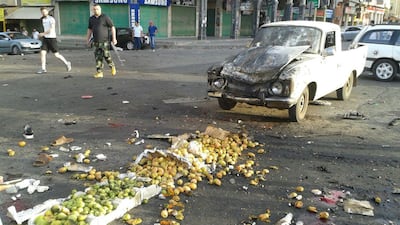More than 180 people were killed in south Syria's Sweida province on Wednesday as ISIS launched an onslaught of attacks and suicide bombings.
The suicide blasts and raids killed at least 183, including 89 civilians, in one of the group's deadliest ever assaults in the country.
ISIS claimed responsibility for the violence on the Telegram messaging app, saying "soldiers of the caliphate" attacked Syrian government positions and security outposts in Sweida city, then detonated their explosive belts.
The Syrian Observatory for Human Rights said three suicide attackers set off booby-trapped belts in Sweida city, as other blasts hit villages to the north and east. A fourth suicide explosion hit the city later.
"ISIS fighters then stormed villages in the province's northeast and killed residents in their homes," the head of the Observatory Rami Abdel Rahman said.
The attacks also killed 94 regime fighters, most of whom were residents who had picked up weapons to defend their villages as well as 30 ISIS fighters, including the attackers.
__________
Read more:
Syria state media says Israel bombs military post in Aleppo
Syrian regime hoist flag over Deraa, cradle of 2011 revolt
Number of women and children in ISIS significantly underestimated, experts say
__________
"Three bombers with explosive belts targeted Sweida city alone, while the other blasts hit villages to the north and east," said the Syrian Observatory for Human Rights.
Rami Abdel Rahman, the head of the Britain-based Observatory, said the group then followed up with further attacks, seizing three of the seven villages it had targeted.
Syria's official news agency SANA confirmed the attack had killed and wounded people in the provincial capital,
publishing images of the attack's aftermath, showing the remains of a victim sprawled on a staircase near a damaged wall. Abandoned shoes lay in the middle of the road among fruit that had spilled out of cartons.
The UN's humanitarian coordinator in Syria Ali Al Zaatari condemned the "terrorist bombing in Sweida city today," saying all civilians should be protected.
And the Russian foreign ministry said the ISIS attacks "confirm the need for energetic and coordinated efforts by the international community to eradicate this universal evil from Syrian territory".
State television also reported casualties in villages to the north and east of the country, adding that the army was "targeting positions of the Daesh (ISIS) terrorist group". Mr Abdel Rahman of the Observatory said unidentified warplanes had been targeting ISIS fighters in that area.
In the northeastern Hasakeh province, an IED in Al Shaddadi city killed one and damaged a car.
Despite pro-government forces ousting the group from urban centres in eastern Syria last year, surprise raids in recent months have killed dozens of regime and allied fighters. On Tuesday night the regime targeted the countryside in eastern Deir Ezzor, the Observatory reported.
In recent weeks regime forces have ousted rebels from most of the area, part of which borders the Israeli-occupied Golan Heights and though it controls almost all of Sweida province, ISIS retains a presence in desert areas of its north and east.
It is now closing in on a patch of territory in nearby Deraa province held by the extremist group Jaish Khaled bin Al Walid, whose 1,000 fighters have pledged allegiance to ISIS.
On Wednesday, Russia-backed regime forces pressed their heavy bombardment of the ISIS-held pocket in Daraa.
At least 41 civilians have been killed in air strikes on the jihadist holdout since July 19, the monitor says.
Fierce clashes between the two sides have killed 49 regime fighters and 67 jihadists.
Syria's south is ostensibly protected from fighting by an internationally brokered ceasefire since last year, but violence has dramatically risen in recent weeks.
Last month, Assad launched a lightning assault that battered rebel areas in the south and brought most of Daraa province under his control.
He then moved onto Quneitra, the neighbouring province which borders the Israeli-annexed Golan Heights.
On Tuesday, a Syrian military source accused Israel of firing at one of its warplanes as it carried out operations against jihadists in Quneitra.
Israel's army earlier said it had shot down a Syrian fighter jet that had infiltrated Israeli airspace, risking another escalation around the sensitive buffer zone.
The Damascus regime has long accused Israel of backing IS and other anti-government factions.
IS overran large parts of Syria and neighbouring Iraq in 2014, but has since lost most of that territory.
More than 350,000 people have been killed and millions displaced since Syria's war started in 2011 with the brutal repression of anti-government protests.
Syria's official news agency SANA confirmed the attack had killed and wounded people in the provincial capital.
State television also reported casualties in villages to the north and east, adding that the army was "targeting positions of the Daesh (ISIS) terrorist group". Mr Abdel Rahman said unidentified warplanes were also targeting ISIS fighters in the area.
In the northeastern Hasakeh province, an IED in Al Shaddadi city killed one and damaged a car.
Despite pro-government forces ousting the group from urban centres in eastern Syria last year, surprise raids in recent months have killed dozens of regime and allied fighters. On Tuesday night the regime targeted the countryside in eastern Deir Ezzor, said the observatory.
In the south the regime of President Bashar Al Assad has in recent weeks ousted rebels from most of the area, part of which borders the Israeli-occupied Golan Heights.
The regime controls almost all of Sweida province but ISIS retains a presence in desert areas of its north and east.
It is now closing in on a patch of territory in nearby Deraa province held by the extremist group Jaish Khaled bin Al Walid, which has pledged allegiance to ISIS.

